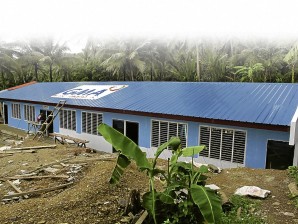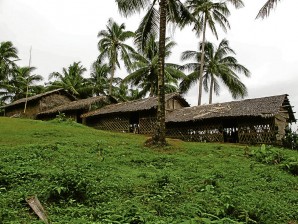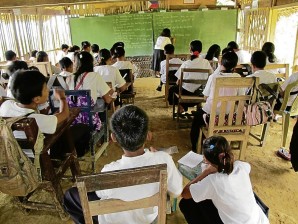TV network relies on ‘bayanihan’ to build new classrooms

Among those actively harnessing the bayanihan spirit are volunteers of the Kapuso School Development (KSD) project of the GMA Kapuso Foundation (GMAKF).
An offshoot of the Kapuso School Rehabilitation Project that focuses on the repair of disaster-stricken classrooms, provides students of underserved public elementary and secondary schools, decent and functional classrooms, steady water supply and sanitation facilities.
It also promotes environmental awareness.
Started in 2003, the KSD project has so far constructed or repaired 265 classrooms in 55 schools all over the country.
Article continues after this advertisementThe latest beneficiary was Adiangao High School in San Jose, Camarines Sur. Volunteers built a three-classroom school building.
Article continues after this advertisementCarmela “Mel” Tiangco, GMAKF executive vice president, said, unlike other initiatives, the KSD resulted from a man-made disaster, the armed conflict in Pikit, North Cotabato.
She said when GMAKF went on a relief and rehabilitation mission in the strife-torn town, they saw that many schools were damaged in the battle between the military and the rebels.
Building peace
“How can we have peace…if the children see the vestiges of war?” Tiangco said.
The foundation decided to rehabilitate four elementary schools in Pikit and another four—two elementary and two high schools—in Pagalungan, Maguindanao.
KSD then decided to look for other areas in dire need of classrooms.
Tiangco said the project would “help the kids help themselves.”
She added, “You need education to break the cycle of poverty in a family.”
Aside from classrooms, the KSD also provides writing boards and chairs. If funds are available, it also builds toilets and toothbrushing facilities.
In Mascap Elementary School in Rodriguez, Rizal, KSD, instead of building classrooms, constructed water supply and hand-washing facilities.
The KSD also encourages beneficiary communities to plant trees around the school.
In choosing school beneficiaries, the GMAKF consults with the Department of Education (DepEd).
The DepEd estimated that the country now needed 146,946 classrooms.
But one important criterion for GMAKF in choosing its beneficiaries is the willingness of the community to help in the project.
Stakeholders
“This (project) is for them (affected communities) so they must have a stake in it. In that way, they will love and care for the schools that we are building,” Tiangco said.
The foundation also checks if the prospective beneficiary is underserved and marginalized, if it is affected by natural or man-made disasters, and if it really lacks classrooms.
KSD’s construction or rehabilitation of schools is funded by donations from companies and private citizens.
Each classroom costs about P500,000, but transporting materials to far-flung areas significantly raises the price.
Tiangco said there were times when materials had to be brought to the mountains or shipped from island to island.
To fill gaps in funding, GMAKF also gets sponsors, such as companies that can provide construction supplies and tools.
Fund-raising activities have also been organized, like the celebrity ukay-ukay spearheaded by husband and wife Ogie Alcasid and Regine Velasquez.
Put on sale were donated clothes, shoes, accessories and other items from celebrities. Expensive items like jewelry, which could not be included in the ukay-ukay, were auctioned off on EBay.
“We realized that all these celebrities had so much in their closets. They didn’t know what to do with their surplus, so we thought to put it to good use,” Tiangco said.
This year, GMAKF plans to have a mini-sports project. Sporting goods will be donated to schools and volunteer athletes will train students.
The foundation will also reactivate the Kapuso Scholarship for deserving students and out-of-school youth.
Contact GMAKF through 9827777 loc. 9901 or e-mail [email protected].


